Rising Sustainability Expectations: How Consumers and Businesses Are Shaping the Future of Delivery?
17 October 2025
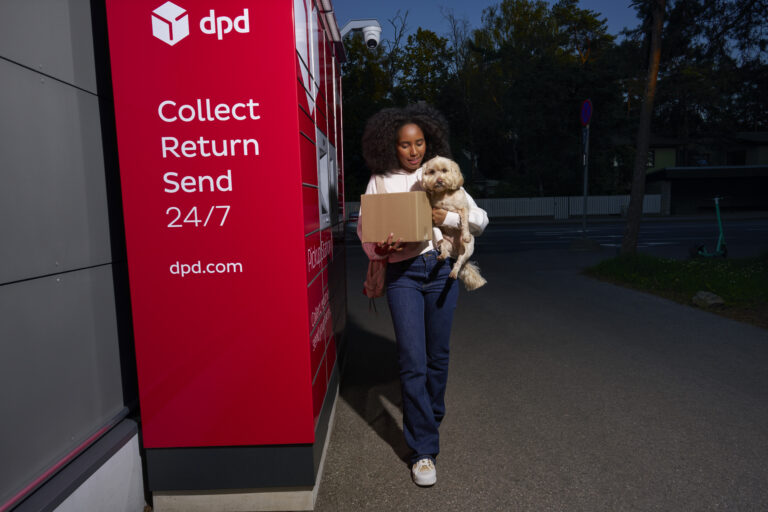
Sustainability is shaping both business strategy and consumer behaviour. Climate change is a daily concern, felt by households and companies alike, influencing decisions from everyday purchases to long-term investments.
At Geopost, we know this because we’ve asked — surveying not only B2C consumers, but also B2B companies. Our aim was twofold: to understand how social and environmental issues are perceived and people respond to them, and to evaluate how today’s economic volatility affects individuals' and businesses’ commitment to sustainable practices.
For companies, climate action is not just important, it is essential to building resilient businesses and operations. At the same time, sustainability expectations are growing. Companies must not only do the right thing but prove it with transparent, authentic communications.
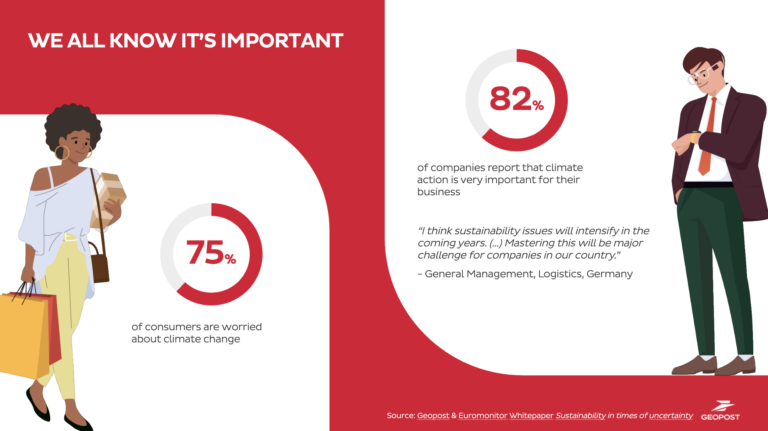
Our research confirms what many already sense: most consumers (75%) and most businesses (82%) share deep concerns about climate change.
In this article, we’ll share these insights from both the consumer and business perspective, exploring how consumer sustainability expectations are influencing behaviour, the opportunities and challenges for sustainable delivery models, and what it will take to respond effectively without compromising trust or performance.
Bridging the intention-action gap in sustainability expectations
When we look at consumer sustainability expectations, one reality becomes clear: people genuinely care about the environment. However, turning that concern into consistent action is not always easy. Many of us are worried about the planet, yet we also have consumption habits we’ve carried for a long time. In our research, we see consumers juggling between their desire to protect the planet and the effort it requires to make meaningful changes — changes that could, in some cases, affect their spending or lifestyle patterns.
There’s often strong support when talking about sustainability as a concept — but when we get to concrete actions, especially those requiring personal efforts or changes in routine, it’s natural for enthusiasm to dip. And if we’re honest, taking action is harder than we think.
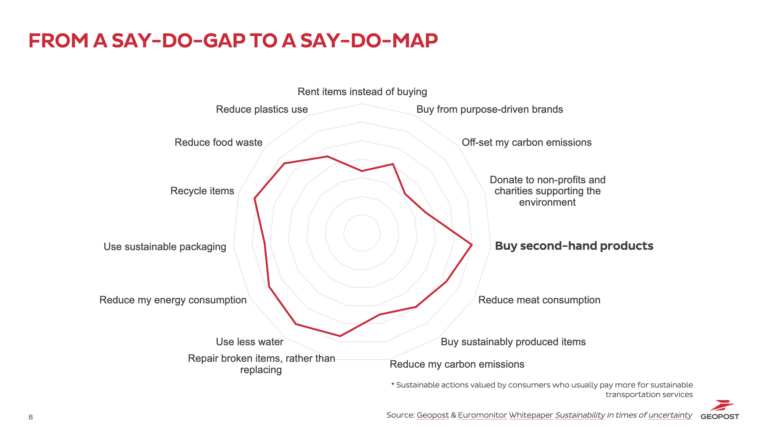
This “intention–action gap” doesn’t mean consumers don’t care, it simply highlights the need to find the “sweet spot,” balancing between good intentions with practical actions they can actually do.
After years of analysing e-shopper behaviour, we co-published a white paper with Euromonitor in 2023. It revealed that while 78% of e-shoppers say they aim to have a positive environmental impact through their daily actions, this motivation tends to fade, dropping to 39%, when they have to pay extra for environmentally friendly products or services.1
Everyday actions that meet sustainability expectations
The good news is that many consumers are already taking tangible steps. Recycling tops the list, followed by water conservation, repairing or reusing goods, and increasingly, buying second-hand items. These are practical, visible actions that fit more easily into daily life while still contributing to sustainable practices.
One of the standout trends is the growth of second-hand shopping. Today, 72% of regular online shoppers say they buy or sell pre-owned items. The motivations are mixed: 68% cite saving money, while over a third highlight their wish to support the circular economy2. This combination of financial and ethical incentives makes second-hand shopping a compelling choice for many.
It is important to note that while sustainability expectations are shared across Europe, what motivates the rise in pre-owned goods isn’t the same everywhere — local culture and economic conditions play a big role. In Poland, where inflation has been high, necessity has accelerated second-hand buying. In France, a long tradition of flea markets keeps the habit strong. And in the UK, there’s a notable culture of donating goods, with charity shops acting as a bridge between ethical giving and budget-friendly buying.
Turning sustainability expectations into a competitive advantage
The pressure on businesses coincides with what consumers feel, but there’s a bit more concrete action happening. Our research tells us that 77% of companies have actually expanded their sustainability practices, and perhaps even more telling, 70% have increased their budgets to support these efforts3.
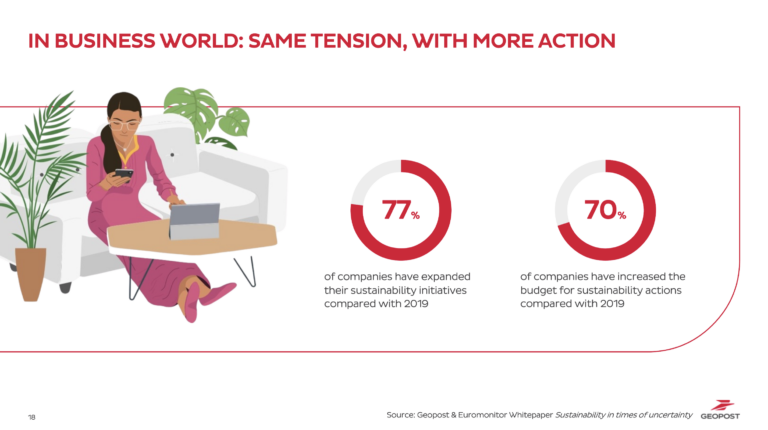
Sustainability expectations are not only acknowledged but actively shaping decisions.
From a strategic standpoint, companies are very much engaged in the subject, though their actions can often differ depending on their size. Large corporations tend to have dedicated teams and substantial resources to focus on sustainable practices, while smaller businesses face more practical constraints. It’s not that small and medium-sized enterprises care less about sustainability — they’re simply juggling more immediate priorities with limited resources. Unlike major corporations, SMEs often lack the same financial flexibility or specialised staff to implement comprehensive programmes, even when they fully value environmental responsibility.
How Geopost is integrating sustainability into core operations
A great example of how Geopost has integrated sustainability into core business processes is Carbon Calculator. Developed in partnership with IT and marketing, it enables us to transparently report the CO₂ emissions related to the transportation of our clients’ parcels. This is crucial because many businesses have set ambitious carbon reduction targets and need to monitor their progress ౼ not only within their own operations but also through their supply chains. Sharing this data helps them establish baselines, measure improvements, and identify where further emission reductions are possible.
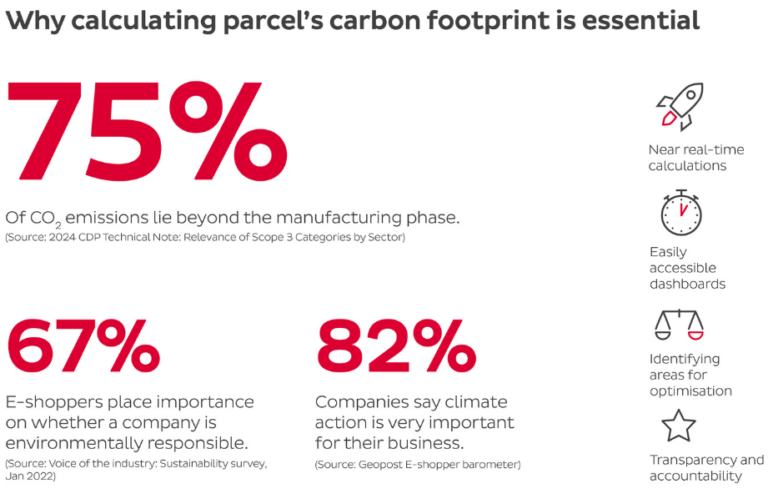
We’ve also developed an in-house Carbon Budget. Co-developed by Geopost’s sustainability and finance teams, it helps us manage our pathway to net zero by aligning investment with CO2 reduction goals.
Why sustainable delivery is becoming the new standard
When we asked businesses why they engage in sustainability, motivations ranged from cost savings (44%) to boosting profits and strengthening reputation4. The commitment is both ethical and strategic, delivering both operational and environmental impact.
And, even in a climate of political pushback and greenwashing concerns, momentum is holding steady. PwC’s 2024 research shows that 84% of businesses are maintaining or accelerating their climate targets5, and nearly all of those surveyed see climate change as a material issue. For these companies, acting on consumer sustainability expectations is about more than image — it’s about resilience, risk management, and ensuring they are working towards more sustainable solutions for tomorrow.
The evolution of sustainable delivery
Sustainable delivery has clearly become more than a niche offering — today, it is an expectation and a long-term licence to operate. To meet this demand, businesses are increasingly turning to low-emission vehicles and consolidated shipments to reduce their environmental impact.
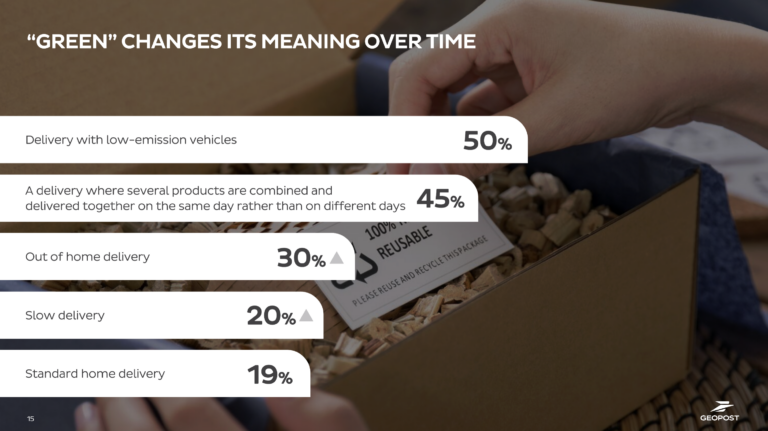
From the consumer’s side, perceptions are shifting as well. More people now see self-collection and “slower” deliveries as environmentally responsible choices, recognising that delivery speed can come with a higher carbon footprint. But the sustainability of delivery doesn’t just depend on what companies offer — it also depends on consumer behaviour. Whether someone lives in an urban or rural area, and whether they choose to walk, drive, or take public transport to collect a parcel, can make a big difference to emissions.
Second-hand commerce and its impact on delivery sustainability
This same shift in mindset is influencing how people buy and sell goods. We’ve already seen how secondhand shopping has become part of everyday consumer life — but its impact goes beyond individual choices. In the delivery sector, the growth is striking.
Since 2020, Geopost’s parcel volumes and revenues from C2C (consumer-to-consumer) shipments of secondhand goods have increased fivefold ౼ one powerful example of how consumer sustainability expectations are reshaping our parcel delivery markets, with buying, selling, and reusing items now firmly embedded in the way customers engage with products.
For companies, there’s a clear business case. A strong sustainability profile can be a point of differentiation — even a unique selling proposition — in competitive markets. But credibility matters. In an era of heightened greenwashing concerns, avoiding misleading claims is critical to building trust. That means communicating sustainable practices transparently, backed by real results.
Building long-term business resilience through sustainability
There’s also a practical side: sustainability can be part of risk mitigation, helping companies adapt to the effects of climate change, from supply chain disruptions to extreme weather. And it’s increasingly a factor in talent attraction and retention. Employees, especially younger generations, want to work for organisations whose ethical values align with their own.
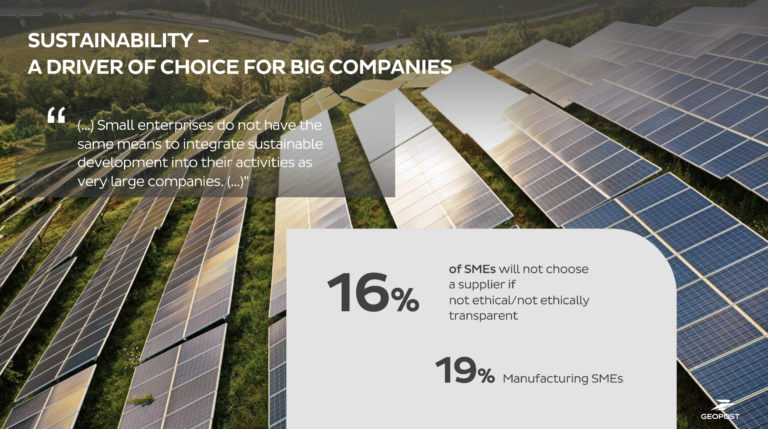
By meeting rising sustainability expectations, businesses aren’t just contributing to environmental protection — they’re positioning themselves for long-term resilience and growth.
Sustainability as a shared responsibility
At Geopost, we believe that sustainability is a shared responsibility. Real progress demands collaboration between businesses, consumers, suppliers, and regulators — because no one can meet today’s sustainability challenges alone. As priorities continue to evolve, they shape consumer behaviours and business models.
We’re committed to credible action — offering sustainable delivery options, tools to measure environmental impact, and transparent communication to address greenwashing concerns. Our goal is to help make sustainable practices the norm, empowering everyone to play their part in a fairer, more sustainable future.
Explore more insights in our latest e-shopper barometer
1. Geopost/Euromonitor. Sustainability in times of uncertainty. 2023
2. 2025 Geopost e-shopper barometer
